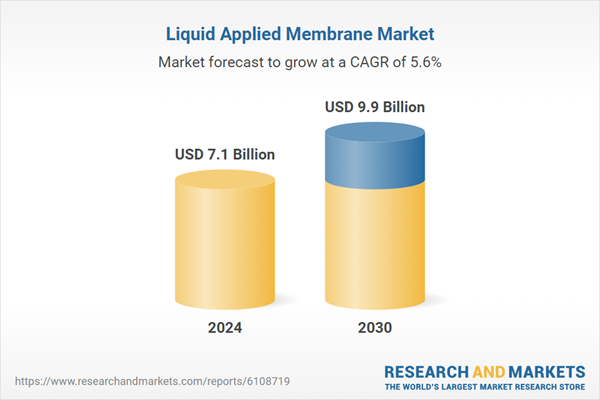Speak directly to the analyst to clarify any post sales queries you may have.
10% Free customizationThis report comes with 10% free customization, enabling you to add data that meets your specific business needs.
Adoption is further supported by global trends emphasizing sustainable construction, with low-VOC and energy-efficient membranes gaining traction, particularly in green building initiatives. In mature markets, aging infrastructure is contributing to retrofitting and renovation demand. Continuous advancements in material science are also enhancing the durability, flexibility, and UV resistance of LAM products. Rising climate concerns and extreme weather events are prompting investment in resilient waterproofing systems, while government-backed energy efficiency programs are reinforcing the market’s long-term potential. Together, these dynamics are positioning liquid applied membranes as an integral component in modern building technologies worldwide.
Key Market Drivers
Rising Demand for Sustainable and Energy-Efficient Construction
The increasing emphasis on environmentally sustainable and energy-efficient buildings is a key driver for the liquid applied membrane market. Regulatory frameworks across North America, Europe, and Asia are becoming more stringent, with mandates to lower emissions and improve building performance. In response, demand for low-VOC, water-based LAMs has accelerated, particularly in projects seeking LEED, BREEAM, or other green building certifications.Developers are prioritizing membranes that offer strong waterproofing, thermal insulation, and environmental safety. Products such as polyurethane, acrylic, and bituminous-based LAMs are being widely used due to their ability to conform to irregular surfaces, extend building lifespans, and support energy conservation goals. These features make them especially suitable for contemporary, sustainability-focused architectural projects.
Key Market Challenges
Volatility in Raw Material Prices and Supply Chain Disruptions
A major challenge for the liquid applied membrane market is the fluctuation in raw material prices, particularly those dependent on petroleum-based inputs like polyurethane, bitumen, and acrylics. Crude oil price instability - driven by geopolitical tensions and global supply-demand imbalances - directly affects production costs, squeezing manufacturer margins and complicating pricing strategies.Additionally, global supply chains have been strained in recent years due to events such as the COVID-19 pandemic, the Russia-Ukraine conflict, and persistent shipping delays. These disruptions have led to material shortages, higher transportation costs, and project delays. For small and mid-sized manufacturers, such unpredictability in supply and cost can hinder competitiveness and affect project execution timelines.
Key Market Trends
Growing Adoption of Eco-Friendly and Low-VOC Liquid Membranes
A notable trend in the liquid applied membrane market is the growing shift toward sustainable, water-based, and low-VOC formulations. As regulatory agencies like the U.S. EPA and the EU’s REACH initiative tighten environmental standards, manufacturers are focusing on cleaner, safer alternatives to traditional solvent-based membranes.Water-based and bio-based LAMs are becoming increasingly popular due to their minimal environmental impact, reduced indoor air pollution, and alignment with green construction certifications. This trend is shaping procurement decisions across both developed and developing markets, with a preference for products that support environmental responsibility without compromising on performance or durability.
Key Market Players
- Sika AG
- BASF SE
- The Dow Chemical Company
- Carlisle Companies Incorporated
- GCP Applied Technologies Inc.
- Tremco Incorporated
- Henry Company LLC
- Kemper System America, Inc.
Report Scope:
In this report, the Global Liquid Applied Membrane Market has been segmented into the following categories, in addition to the industry trends which have also been detailed below:Liquid Applied Membrane Market, By Type:
- Polyurethane
- Cementitious
- Bituminous
- Others
Liquid Applied Membrane Market, By Application:
- Roofing
- Walls
- Underground & Tunnels
- Others
Liquid Applied Membrane Market, By Region:
- North America
- United States
- Canada
- Mexico
- Europe
- Germany
- France
- United Kingdom
- Italy
- Spain
- Asia Pacific
- China
- India
- Japan
- South Korea
- Australia
- South America
- Brazil
- Colombia
- Argentina
- Middle East & Africa
- Saudi Arabia
- UAE
- South Africa
Competitive Landscape
Company Profiles: Detailed analysis of the major companies present in the Global Liquid Applied Membrane Market.Available Customizations:
With the given market data, the publisher offers customizations according to a company's specific needs. The following customization options are available for the report.Company Information
- Detailed analysis and profiling of additional market players (up to five).
This product will be delivered within 1-3 business days.
Table of Contents
Companies Mentioned
- Sika AG
- BASF SE
- The Dow Chemical Company
- Carlisle Companies Incorporated
- GCP Applied Technologies Inc.
- Tremco Incorporated
- Henry Company LLC
- Kemper System America, Inc.
Table Information
| Report Attribute | Details |
|---|---|
| No. of Pages | 188 |
| Published | July 2025 |
| Forecast Period | 2024 - 2030 |
| Estimated Market Value ( USD | $ 7.1 Billion |
| Forecasted Market Value ( USD | $ 9.9 Billion |
| Compound Annual Growth Rate | 5.6% |
| Regions Covered | Global |
| No. of Companies Mentioned | 8 |









